-
 Bitcoin
Bitcoin $82,683.4967
0.78% -
 Ethereum
Ethereum $1,829.2967
1.42% -
 Tether USDt
Tether USDt $0.9999
-0.02% -
 XRP
XRP $2.0967
-0.75% -
 BNB
BNB $606.5472
1.02% -
 Solana
Solana $125.0276
0.61% -
 USDC
USDC $1.0000
-0.01% -
 Dogecoin
Dogecoin $0.1676
0.95% -
 Cardano
Cardano $0.6650
1.26% -
 TRON
TRON $0.2382
2.59% -
 Toncoin
Toncoin $4.1025
5.56% -
 Chainlink
Chainlink $13.5754
1.83% -
 UNUS SED LEO
UNUS SED LEO $9.1395
0.29% -
 Stellar
Stellar $0.2651
-0.15% -
 Avalanche
Avalanche $18.8485
0.75% -
 Shiba Inu
Shiba Inu $0.0...01250
0.76% -
 Sui
Sui $2.2808
-1.77% -
 Hedera
Hedera $0.1640
-1.56% -
 Polkadot
Polkadot $4.0427
0.61% -
 Litecoin
Litecoin $83.3594
-2.70% -
 MANTRA
MANTRA $6.2703
0.56% -
 Bitcoin Cash
Bitcoin Cash $304.1339
1.64% -
 Bitget Token
Bitget Token $4.5229
-1.25% -
 Dai
Dai $0.9999
-0.02% -
 Ethena USDe
Ethena USDe $0.9998
-0.03% -
 Pi
Pi $0.7229
-6.19% -
 Hyperliquid
Hyperliquid $13.0555
5.79% -
 Monero
Monero $215.2463
-1.28% -
 Uniswap
Uniswap $6.0107
2.74% -
 Aptos
Aptos $5.2988
0.53%
How to exchange cryptocurrencies in a Binance wallet?
Binance Wallet lets you easily swap cryptocurrencies; select assets, input amount, confirm. Prioritize strong passwords, 2FA, and understand fees & potential slippage for secure, efficient trading.
Mar 25, 2025 at 05:28 am
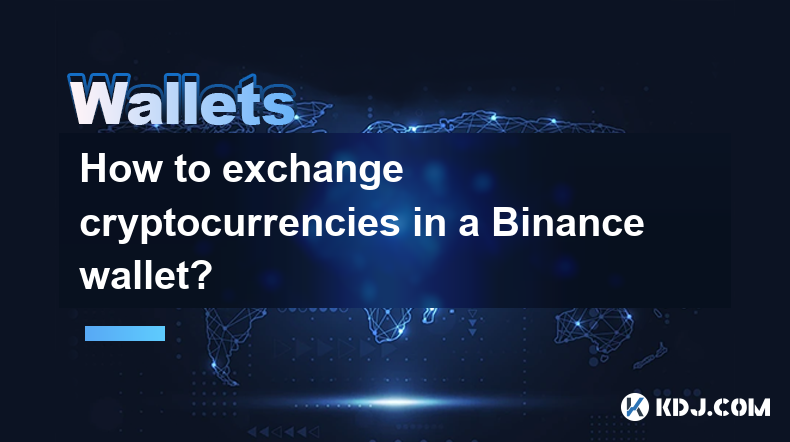
Key Points:
- Binance Wallet supports various crypto-to-crypto exchanges.
- The process involves selecting the assets, entering the amount, and confirming the transaction.
- Security best practices, like using strong passwords and two-factor authentication, are crucial.
- Understanding trading fees and potential slippage is important for efficient trading.
- Binance Wallet offers different exchange interfaces, catering to various user experience preferences.
How to Exchange Cryptocurrencies in a Binance Wallet?
Binance Wallet, while often associated with the Binance exchange, functions as a separate entity offering its own cryptocurrency exchange capabilities. It allows users to swap various cryptocurrencies held within the wallet itself, without needing to transfer assets to the main Binance exchange. This direct exchange feature offers convenience and speed for many users.
The process of exchanging cryptocurrencies within the Binance Wallet is relatively straightforward, although the exact steps may vary slightly depending on the version of the wallet you are using (mobile app versus desktop). However, the fundamental principles remain consistent.
First, you need to ensure you have sufficient funds of the cryptocurrency you wish to exchange in your Binance Wallet. This is a crucial first step. Then, locate the "Exchange" or "Swap" function within the wallet's interface. This feature is usually prominently displayed.
Next, you'll be presented with a screen where you can select the cryptocurrency you want to exchange (the source cryptocurrency) and the cryptocurrency you want to receive (the destination cryptocurrency). Carefully choose the correct assets; double-checking is always recommended to avoid errors.
After selecting the cryptocurrencies, you'll need to specify the amount of the source cryptocurrency you wish to exchange. You can enter the amount manually or use the percentage options often provided. This will automatically calculate the approximate amount of the destination cryptocurrency you'll receive, taking into account the current exchange rate.
Before finalizing the transaction, double-check all the details, including the exchange rate, fees, and the amounts involved. It’s important to understand that the exchange rate can fluctuate, and you might experience some slippage (a slight difference between the expected and actual exchange rate) during the transaction.
Once you're satisfied with all the details, confirm the transaction. The exchange will then be processed, and the newly acquired cryptocurrency will be added to your Binance Wallet. The processing time will vary depending on the network congestion of the involved cryptocurrencies.
Security Best Practices:
- Strong Passwords: Always use a strong and unique password for your Binance Wallet. Avoid using easily guessable passwords or reusing passwords from other accounts.
- Two-Factor Authentication (2FA): Enable 2FA on your Binance Wallet to add an extra layer of security. This typically involves using an authenticator app like Google Authenticator or Authy.
- Regular Software Updates: Keep your Binance Wallet app updated to the latest version to benefit from security patches and bug fixes.
- Beware of Phishing: Be cautious of suspicious emails, links, or messages claiming to be from Binance. Never share your private keys or seed phrase with anyone.
- Secure Device: Use a secure and trusted device to access your Binance Wallet. Avoid using public Wi-Fi networks or untrusted computers.
Understanding Fees and Slippage:
Binance Wallet, like any other cryptocurrency exchange platform, charges transaction fees. These fees are usually a percentage of the transaction value and vary depending on the cryptocurrencies involved and the network conditions. It's essential to understand these fees before initiating an exchange to manage your expectations accurately.
Slippage refers to the difference between the expected exchange rate and the actual exchange rate at the time your transaction is executed. Slippage can occur due to market volatility, especially during periods of high trading volume. Understanding this potential risk is crucial for managing your trading activities.
Different Exchange Interfaces:
Binance Wallet might offer various ways to perform the exchange, such as a simple swap interface or a more advanced interface for experienced traders. The simple interface focuses on ease of use, while the advanced interface might provide more options and control. Choose the interface that best suits your experience level and trading style.
Frequently Asked Questions:
Q: Can I exchange all cryptocurrencies listed on Binance on Binance Wallet? A: No, Binance Wallet supports a subset of the cryptocurrencies available on the Binance exchange. The available assets may vary over time.
Q: What are the fees for exchanging cryptocurrencies in Binance Wallet? A: Fees vary depending on the cryptocurrencies involved and the network conditions. You will see the exact fee before confirming each transaction.
Q: How long does it take to exchange cryptocurrencies in Binance Wallet? A: The time varies depending on network congestion. It can range from a few seconds to several minutes.
Q: Is it safe to exchange cryptocurrencies in Binance Wallet? A: Binance Wallet employs security measures, but it's crucial to follow best practices, such as using strong passwords and 2FA, to enhance your security.
Q: What happens if I make a mistake during the exchange process? A: It depends on the nature of the mistake. If you haven't confirmed the transaction, you can usually cancel it. If the transaction has already been processed, you might need to contact Binance Wallet support for assistance. Careful attention to detail is crucial to prevent errors.
Q: Can I exchange fiat currency for cryptocurrency in Binance Wallet? A: No, Binance Wallet primarily focuses on crypto-to-crypto exchanges. For fiat-to-crypto transactions, you would typically need to use the Binance exchange platform itself.
Q: What should I do if I encounter an error during the exchange? A: Check your internet connection, ensure sufficient funds, and review the transaction details carefully. If the issue persists, contact Binance Wallet support. They have customer support channels available to assist users.
Disclaimer:info@kdj.com
The information provided is not trading advice. kdj.com does not assume any responsibility for any investments made based on the information provided in this article. Cryptocurrencies are highly volatile and it is highly recommended that you invest with caution after thorough research!
If you believe that the content used on this website infringes your copyright, please contact us immediately (info@kdj.com) and we will delete it promptly.
- Nigeria's New Investment Act (ISA) 2025 Officially Recognizes Cryptocurrencies as an Asset Class
- 2025-04-01 09:00:12
- Bitcoin (BTC) Halving Promises New All-Time Highs in 2025, But Will History Rhyme?
- 2025-04-01 09:00:12
- Elite Analyst Warns Bitcoin Holders: ‘Little to No Support’ Until $70k
- 2025-04-01 08:55:11
- Pre-Market Analysis: 3 Cryptocurrencies That Could Steal the Show in the Next Bull Run
- 2025-04-01 08:55:11
- Celo's Transition to an Ethereum L2 Blockchain Signals a Broader Industry Shift
- 2025-04-01 08:50:11
- Animoca Brands and Sony's Soneium blockchain are bringing anime culture into the web3 world
- 2025-04-01 08:50:11
Related knowledge
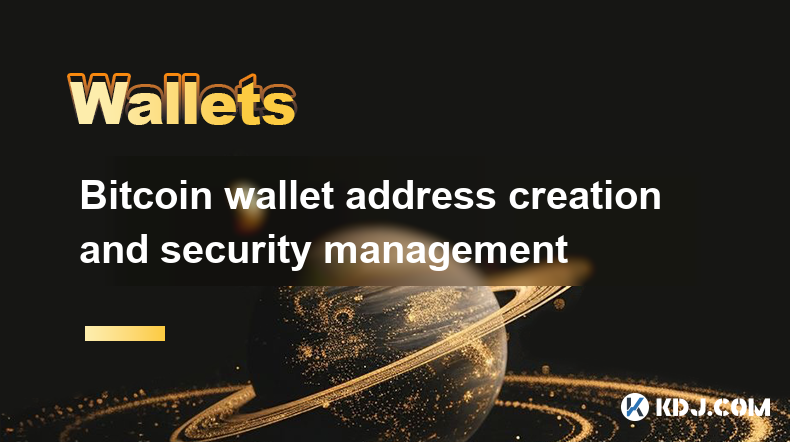
Bitcoin wallet address creation and security management
Mar 31,2025 at 10:56pm
Understanding Bitcoin Wallet AddressesA Bitcoin wallet doesn't store Bitcoin directly. Instead, it stores private keys which are long strings of characters. These keys grant access to your Bitcoin. Your public key, derived from the private key, is used to generate your Bitcoin wallet address, a unique identifier similar to a bank account number. This a...

How to easily generate a Bitcoin payment address
Mar 29,2025 at 10:49am
Generating a Bitcoin payment address might seem daunting, but it's actually quite straightforward. This process is crucial for receiving Bitcoin, as each transaction requires a unique address. Understanding how this works is fundamental to using Bitcoin effectively. This guide will walk you through the simple steps, regardless of your technical experti...
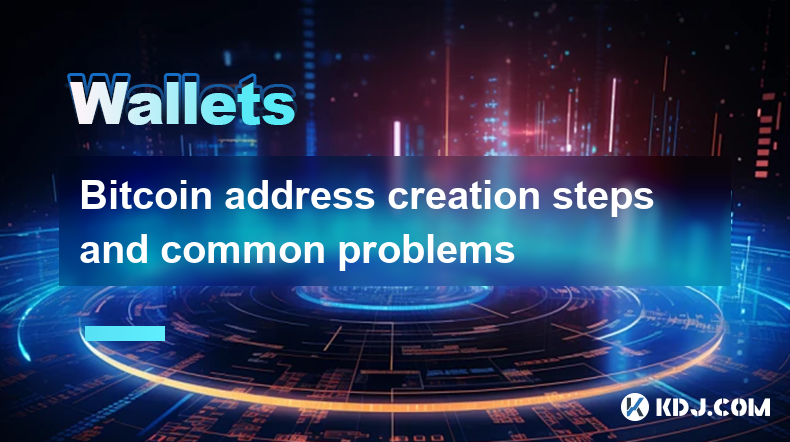
Bitcoin address creation steps and common problems
Mar 30,2025 at 06:07am
Understanding Bitcoin AddressesA Bitcoin address is a unique identifier, similar to a bank account number, used to receive Bitcoin. It's a string of alphanumeric characters generated from a public key, derived from your private key. Understanding the distinction between public and private keys is crucial for Bitcoin security. Your private key should be...
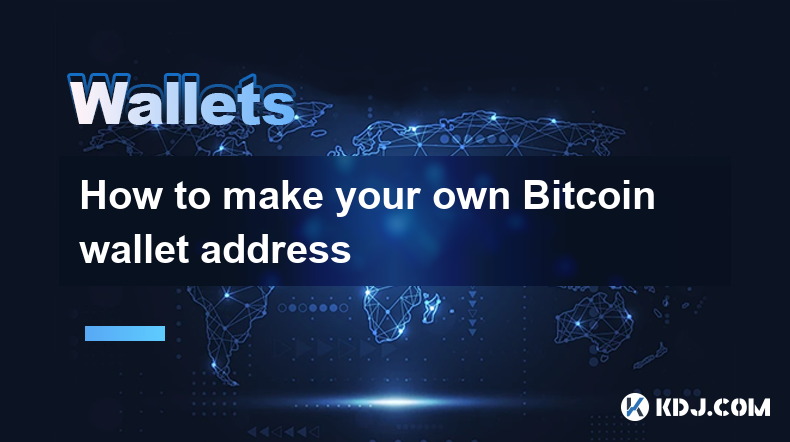
How to make your own Bitcoin wallet address
Mar 29,2025 at 08:42pm
Creating your own Bitcoin wallet address is crucial for securing and managing your Bitcoin holdings. It allows you to independently receive and send Bitcoin without relying on third-party services. This process involves understanding the different types of wallets and choosing the one that best suits your needs and technical expertise. Incorrectly gene...
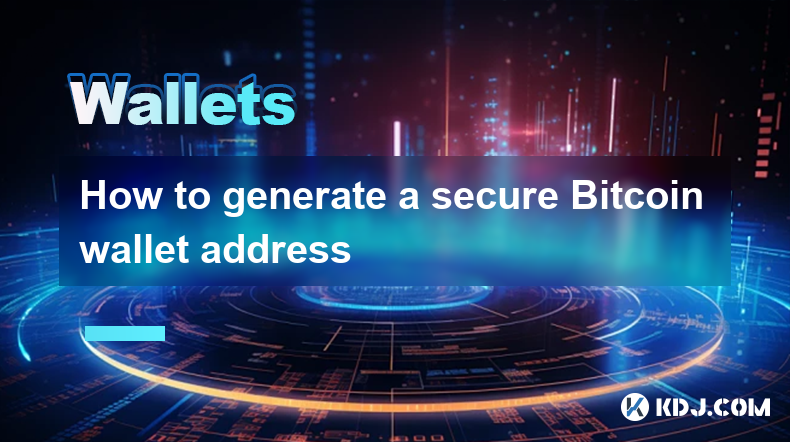
How to generate a secure Bitcoin wallet address
Apr 01,2025 at 03:14am
Understanding Bitcoin Wallet AddressesA Bitcoin wallet doesn't actually store your Bitcoin. Instead, it stores your private keys, which are long strings of characters that grant you access to your Bitcoin. Your public key, derived from your private key, is used to generate your Bitcoin address, a unique identifier similar to a bank account number. This...
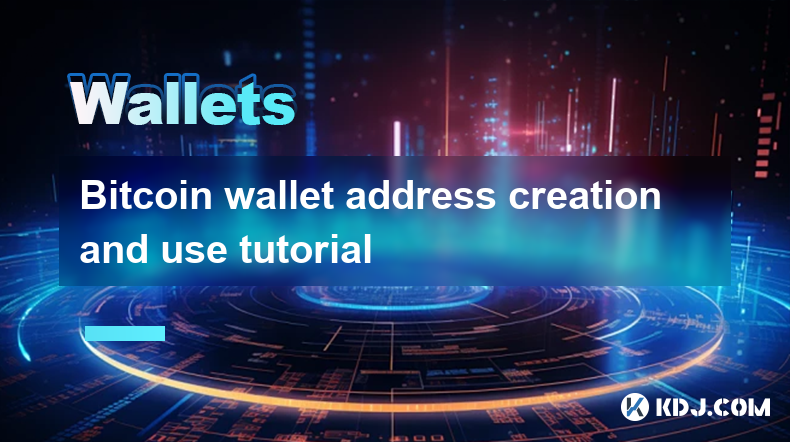
Bitcoin wallet address creation and use tutorial
Mar 29,2025 at 10:14pm
Understanding Bitcoin Wallet AddressesA Bitcoin wallet doesn't store Bitcoin in the way a traditional bank account does. Instead, it stores private keys, which are cryptographic secrets allowing you to access and spend your Bitcoin. Your Bitcoin address, on the other hand, is a public identifier, like an email address, that others can use to send you B...

Bitcoin wallet address creation and security management
Mar 31,2025 at 10:56pm
Understanding Bitcoin Wallet AddressesA Bitcoin wallet doesn't store Bitcoin directly. Instead, it stores private keys which are long strings of characters. These keys grant access to your Bitcoin. Your public key, derived from the private key, is used to generate your Bitcoin wallet address, a unique identifier similar to a bank account number. This a...

How to easily generate a Bitcoin payment address
Mar 29,2025 at 10:49am
Generating a Bitcoin payment address might seem daunting, but it's actually quite straightforward. This process is crucial for receiving Bitcoin, as each transaction requires a unique address. Understanding how this works is fundamental to using Bitcoin effectively. This guide will walk you through the simple steps, regardless of your technical experti...

Bitcoin address creation steps and common problems
Mar 30,2025 at 06:07am
Understanding Bitcoin AddressesA Bitcoin address is a unique identifier, similar to a bank account number, used to receive Bitcoin. It's a string of alphanumeric characters generated from a public key, derived from your private key. Understanding the distinction between public and private keys is crucial for Bitcoin security. Your private key should be...

How to make your own Bitcoin wallet address
Mar 29,2025 at 08:42pm
Creating your own Bitcoin wallet address is crucial for securing and managing your Bitcoin holdings. It allows you to independently receive and send Bitcoin without relying on third-party services. This process involves understanding the different types of wallets and choosing the one that best suits your needs and technical expertise. Incorrectly gene...

How to generate a secure Bitcoin wallet address
Apr 01,2025 at 03:14am
Understanding Bitcoin Wallet AddressesA Bitcoin wallet doesn't actually store your Bitcoin. Instead, it stores your private keys, which are long strings of characters that grant you access to your Bitcoin. Your public key, derived from your private key, is used to generate your Bitcoin address, a unique identifier similar to a bank account number. This...

Bitcoin wallet address creation and use tutorial
Mar 29,2025 at 10:14pm
Understanding Bitcoin Wallet AddressesA Bitcoin wallet doesn't store Bitcoin in the way a traditional bank account does. Instead, it stores private keys, which are cryptographic secrets allowing you to access and spend your Bitcoin. Your Bitcoin address, on the other hand, is a public identifier, like an email address, that others can use to send you B...
See all articles























































































